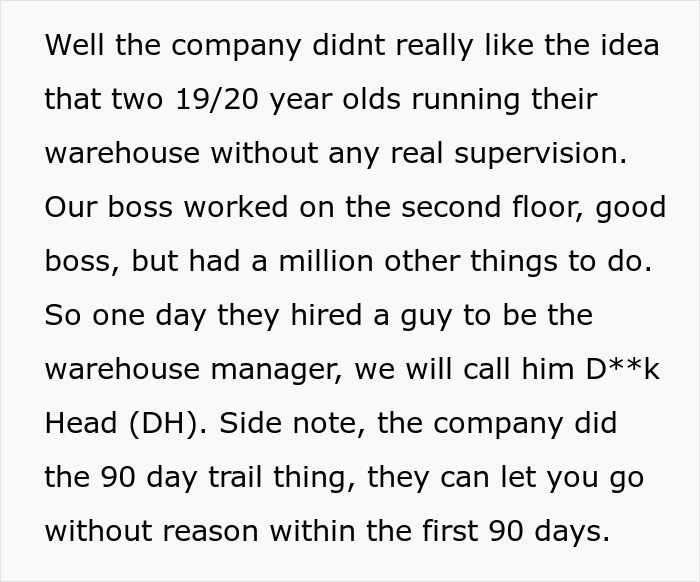Few things are more frustrating than an annoying superior. Whether it’s micromanaging, yelling, or being short-tempered that they specialize in, they can sure make their employees’ life needlessly more difficult.
This redditor was no exception. When the company hired a manager to run the warehouse he was working in, the superior didn’t make the day-to-day any easier. On the contrary, he got on the employees’ nerves, which eventually led to malicious compliance.
Some managers are only good at annoying their employees

Image credits: Tiger Lily / Pexels (not the actual photo)
This redditor chose malicious compliance to deal with an aggravating superior




Image credits: Kampus Production / Pexels (not the actual photo)





Image credits: Tiger Lily / Pexels (not the actual photo)





Image credits: Crypto Crow / Pexels (not the actual photo)



Image credits: RedEd024

Image credits: Djordje Petrovic / Pexels (not the actual photo)
People spend roughly ten years of their lives working
An aggravating superior can make things difficult on many levels, from affecting the workflow to impacting the employees’ health and well-being. That comes as no surprise considering that an average person spends roughly 90,000 hours of their lifetime at work; that’s more than a decade of life spent dealing with work-related matters and people.
Unfortunately, many employed adults reportedly spend this decade next to people they wouldn’t consider dear to their hearts, to put it mildly. Goodhire’s survey of 3,000 Americans working in ten of the most popular sectors found that while 70% of them actually enjoy working for their manager, the rest—don’t.
Not only that, more than eight-in-ten of them say they could do their job without the manager’s supervision—as the OP seemingly did before and after the supervisor joined the company—and roughly as many believe they could even do their manager’s job themselves.
Based on Goodhire’s data, micromanaging and asking employees to work outside of the scheduled hours are the things superiors do that employees hate the most. Another survey, carried out last year by Society for Human Resource Management (SHRM), found that other aggravating habits include playing favorites, taking credit for others’ work, discussing poor performance in front of other people, and informally threatening to fire employees respectively.

Image credits: Yan Krukau / Pexels (not the actual photo)
Quite a few employed individuals have had to suffer from a toxic environment or people at work
Whether it’s playing favorites or micromanaging that gets on employees’ nerves the most, quite a few of them have had to work with a boss they would even call toxic. Needless to say, a toxic environment doesn’t make bearing the workload any easier. According to FlexJob’s 2023 survey, the majority of employed adults have worked in a toxic environment at some point in their lives.
The survey found that nearly nine-in-ten of them have worked with a toxic boss at least once, half of them have suffered increased anxiety because of such a superior, and more than four-in-ten have quit because of toxic behavior in their workplace.
A 2023 survey regarding working conditions in the US, published by the American Psychological Association, found that nearly one fifth of employees consider their workplace toxic; and they have to deal with the consequences. Nearly 80% of them have reported experiencing work-related stress in the month prior to the survey and nearly 60% felt negative impacts, such as emotional exhaustion, lack of motivation, and irritability or anger with coworkers and customers, among other things.
The OP seemingly didn’t let it all out on the customers or the fellow co-worker he was running the warehouse with; however, there was a time when he nearly got into an actual fight with the supervisor, a story that the redditor shared with fellow netizens in the comments under his post.
As per the redditors’ request, the OP shared another work-related story



Fellow netizens shared their thoughts in the comments









